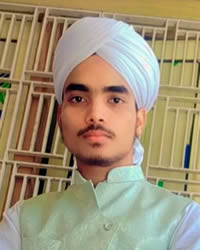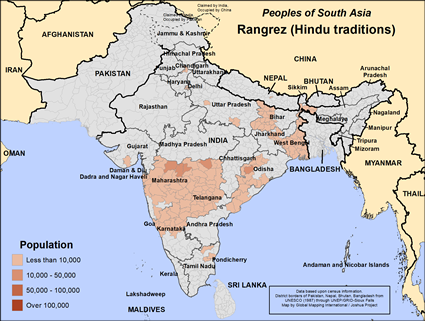Rangrez (Hindu traditions) in India

Photo Source:
Anonymous
|

Map Source:
People Group data: Omid. Map geography: UNESCO / GMI. Map Design: Joshua Project.
|
| People Name: | Rangrez (Hindu traditions) |
| Country: | India |
| 10/40 Window: | Yes |
| Population: | 360,000 |
| World Population: | 360,000 |
| Primary Language: | Marathi |
| Primary Religion: | Hinduism |
| Christian Adherents: | 0.00 % |
| Evangelicals: | 0.00 % |
| Scripture: | Complete Bible |
| Ministry Resources: | Yes |
| Jesus Film: | Yes |
| Audio Recordings: | Yes |
| People Cluster: | South Asia Hindu - other |
| Affinity Bloc: | South Asian Peoples |
| Progress Level: |
|
Introduction / History
The Hindu Rangrez are a group of people who live in north and central India. Their traditional occupation was that of dyeing and printing cloth. The word Rangrez means one who pours on color or dyes in Persian. Many believe they came from Central Asia. The Rangrez are considered a Backward Caste and have become eligible for special places in public employment and university admission.
Many Rangrez are leaving their original career of dyeing and printing fabric. Cheap, chemical dyes have replaced the natural dyes used by the Rangrez, which tend to fade after washing. Rich colors play an important part in Indian rituals like weddings. Many Rangrez have begun to engage in the business of selling fabric and clothing. Other Rangrez have become involved in trade and other small businesses. Most Rangrez do not own land.
The majority of the Hindu Rangrez speaks Marathi as their primary language. Some also speak Kannada, Hindi, Telegu and Odia are their first language.
Where Are they Located?
Most of the Rangrez live in the four Indian states of Maharashtra, Karnataka, Odisha and Telangana. Other smaller groups live in other states across the nation of India.
What Are Their Lives Like?
The Rangrez are endogamous. They tend to marry within their caste. Some marry their own cousins while others will not marry anyone in their clan. Families arrange the marriages within the consent of the young people. Brahmin priests officiate at significant rituals like birth, weddings and funerals. Sons inherit their father's property. The Hindu Rangrez bury their cremated remains.
Most Rangrez live in multi-caste, multi-religion villages. They will live by themselves in a part of the village. Many young people are moving to the cities for better economic and educational opportunities.
Caste councils promote the interests of the Rangrez and decide legal disputes within the community.
What Are Their Beliefs?
The Rangrez practice Hinduism, the ancient religion of India. They worship and serve the gods of the Hindu pantheon. Hindus believe that by performing rituals and good works that they will attain moksha or freedom from the endless cycle of birth, death and rebirth. The Rangrez visit Hindu temples and offer prayers, food, flowers and incense to their gods.
The main yearly holidays of the Hindu Rangrez people are Holi, the festival of colors, Diwali, the festival of lights and Navratri, the celebration of autumn.
What Are Their Needs?
The Hindu Rangrez need to hear the life-changing gospel of Jesus Christ in a way they can understand. They need to see the love and mercy of Christi lived out in practical ways before them. They would benefit from job training since their traditional career of dyeing cloth using natural dyes is disappearing.
Prayer Points
Pray that a strong movement to Jesus will bring whole Rangrez families and communities into a rich experience of God's blessings.
Pray the members of the caste councils would become Christians and lead their families to Christ.
Pray that Indian Christians would reach out and share the gospel with the Hindu Rangrez.